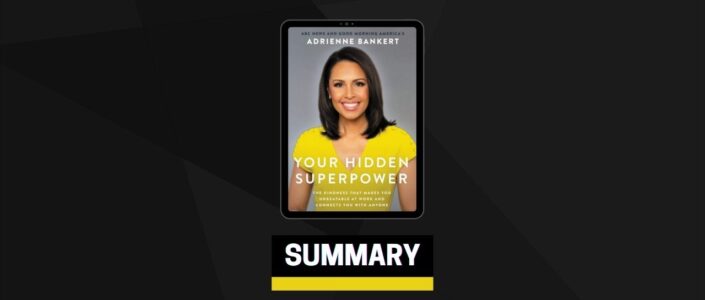The Ask: Kindness 2.0
There is an unbeatable superpower inside every one of us that is far greater than talent or tenacity. It supersedes strength and intelligence. It crushes selfishness, negativity, and doubt.
It will bring you to 100 percent authenticity, develop unfailing integrity, and help you build trust with anyone. It’s something that every individual, and every corporation, needs more of today. Our world, companies, and communities are asking for something more of us than simply getting the job done. The ask right now is for people who know how to be kind under pressure. This is about more than merely “getting along” with people. Your hidden superpower—kindness—reveals the highest and best version of you.
Kindness is the answer because our world is so busy and intense. Inevitably, that can lead to short tempers, burnout, increasing anger, and defensive debates. Witnessing kindness brings renewed hope in humanity in the face of jadedness. Kindness keeps us sane when the demands of juggling work and relationships put us on edge and fill us with the urge to lash out.
We can cause irreparable damage when we are unkind, which can lead to becoming numb or unsympathetic—something none of us can afford. We all have the ability to “stop the madness” by being purposefully kind.
Kindness added to any endeavor is a magnet for positivity and a cure for the inevitable side effects of stress. Kindness is an anchor to the soul and the universal language of hope for the billions on the planet searching for meaning. Kindness is inclusive. Kindness displays unity. Kindness is beneficial for all and is mandatory for those who are seeking true success, no matter the goal. Kindness is the gateway to new relationships and
It’s kindness that will give you a powerful purpose. You won’t just make an entrance or impression; you will fill the room.
Kindness is more than the golden rule; it is a superpower. And amazingly, it is within reach for every one of us.
It is time to change our perspective.
The Kind: Power to Be You
Most of us have experienced a time of losing ourselves, forgetting who we are, or not knowing who we are in the first place. For some it might have been the years between childhood and young adulthood, or as we approached thirty, or some sort of midlife, midcareer crossroads. You can remain anchored to your authentic identity by being kind. Kindness is the surefire way to replenish your purpose by reuniting to the highest and best version of you.
Let’s first answer what is a tough question for most people: WHO ARE YOU?
It’s not about what you’re good at, where you’ve worked, or what your friends say about you.
“Just be yourself.”
In the beginning we have enough raw tenacity to go out and try whatever it is we are after, even if we have no idea who we are. Our youthful ambition is enough to get us in the door. That ambition can wane over the years when we don’t reach the milestones we think we should by a certain age, or after having a certain amount of experience, according to our personal timetable.
When we don’t hit certain milestones—and the further in life we go without achieving them—we may end up defining ourselves based on what we have not done yet. We become our own worst critic. As we go through life, every time we hear the words, JUST BE YOURSELF, it eventually becomes a barometer for just how much we don’t know what that means! Many have no idea what makes them uniquely qualified to be special or accomplished, especially when it looks like they have not done enough. Fortunately, along the journey of discovery we learn more and more about what we want to do in relation to what kind of person we are or at least the kind of person we want to be. Here’s the golden ticket: my first answer to, “Who are you?” is always, “I am kind.”
Someone Is Always Watching
We all inherently want to know that someone truly sees us; that someone believes we are special and that we have their attention. The problem is that after years of hurt and disappointments, some of us don’t believe anyone is paying attention. On one hand, we can lose focus of how we affect others. On the other hand, there is the problem with not doing anything about who we do notice. Too often we either don’t recognize that someone needs our attention, or we feel we cannot do anything about the coworker who is depressed, lonely, or in need of a pep talk or a smile. When we are the one in need of that encouragement, it helps to know someone is aware of us enough to do something about it, and it can be a breakthrough or a real lifesaver. It’s up to us to choose to pay attention to others.
Being kind by realizing someone is always watching will make you constantly aware of a bigger picture.
Kind vs. Nice: Beyond Default Mode
Kind and nice are used interchangeably in the first definition listed in Noah Webster’s American Dictionary of the English Language. Other definitions hint at the root meaning of nice, describing exactness:
Nice, adjective
1.polite, kind
2.pleasing, agreeable
3.socially acceptable: well-bred
4.possessing, marked by, or demanding great or excessive precision
When you study the word nice, you can see that it is basically about exactness and execution. It reminds me of how many of us act when we have our first internship or first job. We want to do everything right. Behind our nice twentysomething smiles, we are fragile, worried, and determined to make a good impression. Most of us are not secure enough when we come into this new environment to be our true, confident selves. Unfortunately, too many people increase in position, experience, and connections without ever developing the confidence to display social skills that are rooted in true kindness.
One of the biggest hindrances to true kindness is that we think we are already kind, or kind enough. If this is the case, then we won’t even bother changing our behavior. The first step we need in being able to grow is determining that kindness is like love—it can be nurtured and is vast. Second, we need to learn from those who are already kind. A mentor or coach can help you know what being kind truly means. There are layers and levels to kindness and tools for maximizing its effects in your life.
But here’s the deal: desire being kind instead of nice because you will not only grow personally, but also so you are ready to be properly coached or mentored. Because nice will not cut it.
Kind to Your Crew: Allies at Work
Code of Conduct #1: Never say an unkind thing about anyone, ever. If someone starts gossiping to you, you don’t have to say, “I do not gossip.” Just look away, look to your notes, get on your phone, or look at them and shake your head, but do not respond verbally. You can try to change the subject. I apply this even with my friends. Gossip can be far too easy to enter into and is destructive to company culture. It is something that most everyone has done in their life, usually as a result of being exposed to it. The people who gossip are not bad people; sometimes they think they are doing you a favor. Never say an unkind thing about your work partner, even if it is true. Treat them with dignity, even if you see an area they can grow in.
Code of Conduct #2: Treat older staff with the utmost respect.
Code of Conduct #3: Decide that inside every grouchy person is a lovely human. Typically, management will send someone “green” out with the most experienced staffer, the one most known for their no-nonsense demeanor or toughness. Often these are the most passionate people in our business. They are the best, and because of their experience (having seen the best and the absolute worst in humanity), they are possibly the most jaded. After coming in very young and gifted, they have many times been chewed up and spit out over life’s journey. They are also often the most innovative and visionary. However, because of time and trials, they’ve picked up habits some consider lazy. If it seems they are on constant smoke or meal breaks, it could be because they are so talented and experienced, they can do what it takes to get the job done in their sleep. They might appear to move a lot slower, but they are often mentally faster than their younger colleagues because of years of experience and repetition. They can be more difficult to manage because they are nearly indispensable, yet they don’t always get along with others.
Simply believe in everyone, instead of mentally giving up on them. Even if the difficult one is adamantly against everything you stand for, you can be the difference maker who quietly and confidently whispers—in spite of being yelled at, left hanging, or betrayed—“You will learn to love me.”
The Power of Giving
Living a life of kind giving means looking at your resources and the resources of others to become more creative. When we are having our toughest moments in life, getting refocused on giving can be a huge inspiration to renew passion. When we give more, we live more. We live more purposed and productive lives, which will allow us to be truly present as we work, play, and go on this journey to ultimate fulfillment.
In order to truly possess this kind of openness, we must think of ourselves making a bigger mark on the world—one that will affect neighborhoods, families, and generations beyond our own. In order to do that, you have to think like a person who has a wealth of resources, which could mean cash, friends, connections, business associates, and talents. This is why: if you think of yourself as not having enough, as someone who is lacking in gifts, talents, friends, or connections, you may prevent yourself from stepping out and being generous. You will be, or likely have been, more concerned about your own needs, like paying your bills, than being benevolent. Your money situation can change. What should not change is your kindness; you should remain constant and current in that. Being current in kindness becomes your currency, and generosity is an outpouring of that.


